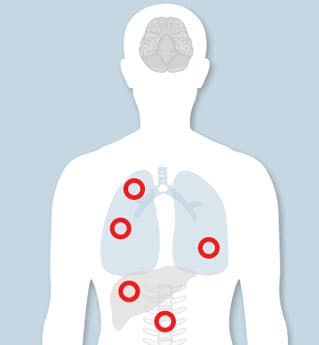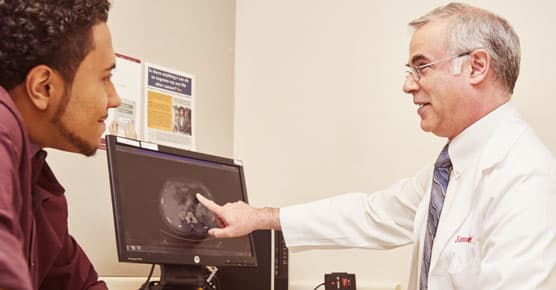Esophageal Cancer Treatment
At the University of Chicago Medicine, we provide an individualized approach to cancer treatment. All patients are different, as is their cancer stage, age, overall health and preference for care. Our esophageal cancer team will explain all of your treatment options and take the time to answer your questions and ease your concerns.
As with most cancers, esophageal cancer treatments differ according to the stage of disease. We may use the treatments below individually or in combination with other therapies to treat your cancer.
Surgery is for esophageal cancer that has not spread beyond the esophagus and surrounding lymph nodes. The goal is to remove the cancer and nearby tissue that may be affected. In an esophagectomy, a surgeon removes part of your esophagus, nearby lymph nodes and possibly part of the stomach. The remaining part of your esophagus is then connected to your stomach.
You may be a candidate for minimally invasive surgery, an approach that utilizes smaller incisions to remove the cancer. Benefits of minimally invasive surgery include less pain, less scarring and a quicker recovery. UChicago Medicine surgeons are pioneers in minimally invasive surgery for esophageal cancer.
An esophagectomy is major surgery, and studies show that patients who have esophagectomies at hospitals that perform the procedure more frequently fare better than those who go to hospitals with less experience. At UChicago Medicine, our general and thoracic surgeons are experts in esophageal cancer surgery.
Endoscopic mucosal resection (EMR) and endoscopic submucosal dissection (ESD) are effective treatments for early stage esophageal cancer, especially for patients who can’t have surgery. EMR involves the use of special tools that lift and cut abnormal lesions or tumors from the superficial lining (mucosal and submuscosal layers) of the esophagus. EMR is performed by interventional endoscopists — gastroenterologists who have special expertise using endoscopes, which are thin tubes equipped with cameras. Our interventional gastroenterologists were among the first in the nation to employ EMR and ESD techniques to treat Barrett’s esophagus and high-grade dysplasia. Our specialists work closely with cancer surgeons to select patients who are ideally suited to endoscopic removal of their pre-cancerous lesions versus those who would require surgery for their condition.
Chemotherapy is the use of anticancer medicines to treat cancer cells. Patients with advanced cancer that has not spread may receive chemotherapy with or without radiation before surgery to reduce tumor size and kill cancer cells that are not visible. If your cancer hasn’t spread but you’re not a candidate for surgery, chemotherapy and radiation are given together. If the cancer has spread to other organs, chemotherapy, and in certain cases immunotherapy, can help lessen symptoms such as difficulty swallowing and pain.
At the Center for Gastrointestinal Oncology, our oncologists are highly skilled at selecting the best course of chemotherapy, targeted therapy and immunotherapy for each patient.
UChicago Medicine radiation oncologists are internationally known for their expertise in treating cancer. Our radiation oncology team is a leader in conducting studies to improve the effectiveness of radiation, all while minimizing its side effects.
We understand that the symptoms associated with esophageal cancer, such as pain and difficulty swallowing, can be very difficult for patients. In addition to treatments designed to destroy cancerous tissue, our physicians also offer palliative therapy. These treatments do not aim to cure your cancer, but rather lessen your symptoms and make you comfortable.
Palliative therapy options offered include the following:
- Stent placement, which involves the insertion of an expandable, metal tube to relieve obstructions of the esophagus and improve your swallowing
- Specialized nutritional care to ensure you receive adequate nutrition
- Individualized pain management to help keep you comfortable
- Individual or group counseling to provide you and your family with a better understanding of the disease
The supportive oncology program offers a wealth of resources for patients and families facing cancer.

Treating Metastatic Cancer with Optimism and Hope
If you have been diagnosed with metastatic cancer, more therapies may be available to you than you think. Our cancer specialists are eager to help you understand all of your options.
Limited Metastatic Cancer ProgramWhat Does It Mean to Be an NCI-Designated Comprehensive Cancer Center?
It is a gold standard of excellence, awarded only to cancer centers with the deepest and broadest knowledge of cancer. These places have strengths in all the areas of cancer research, including prevention, early detection, treatment, and survivorship.
Out of the hundreds of thousands of facilities that specialize in cancer, only 70 are officially NCI designated. And of those, only 49 hold the special comprehensive status. This designation places us among the top tier of cancer centers in the country, and one of two in Illinois.
Comprehensive cancer centers serve as a model for moving new discoveries from the laboratory setting to reach patients and the greater community. In order to keep this designation and funding, every NCI designated cancer center must undergo an intense review process every five years to demonstrate that it has a critical mass of high quality, collaborative research that leads to big shifts in cancer care-- strong institutional support, a highly qualified director, state-of-the-art facilities, and the ability to bring physicians and scientists from multiple disciplines together.
For meeting all of these standards, we have earned the distinction as a Comprehensive Cancer Center. Our most recent review in 2017 earned our center an outstanding rating. This means that our patients benefit from being treated at a world-class research facility, with leading physicians and scientists who are dedicated to improving the prevention, detection and treatment of cancer in Chicago and beyond.

Cancer Care Second Opinions
Request a second opinion from UChicago Medicine experts in cancer care.

Participate in a Clinical Trial
Find an esophageal cancer clinical trial that's right for you.

Center for Esophageal Diseases
The Center for Esophageal Diseases is dedicated solely to the diagnosis and treatment of disorders of the esophagus.
